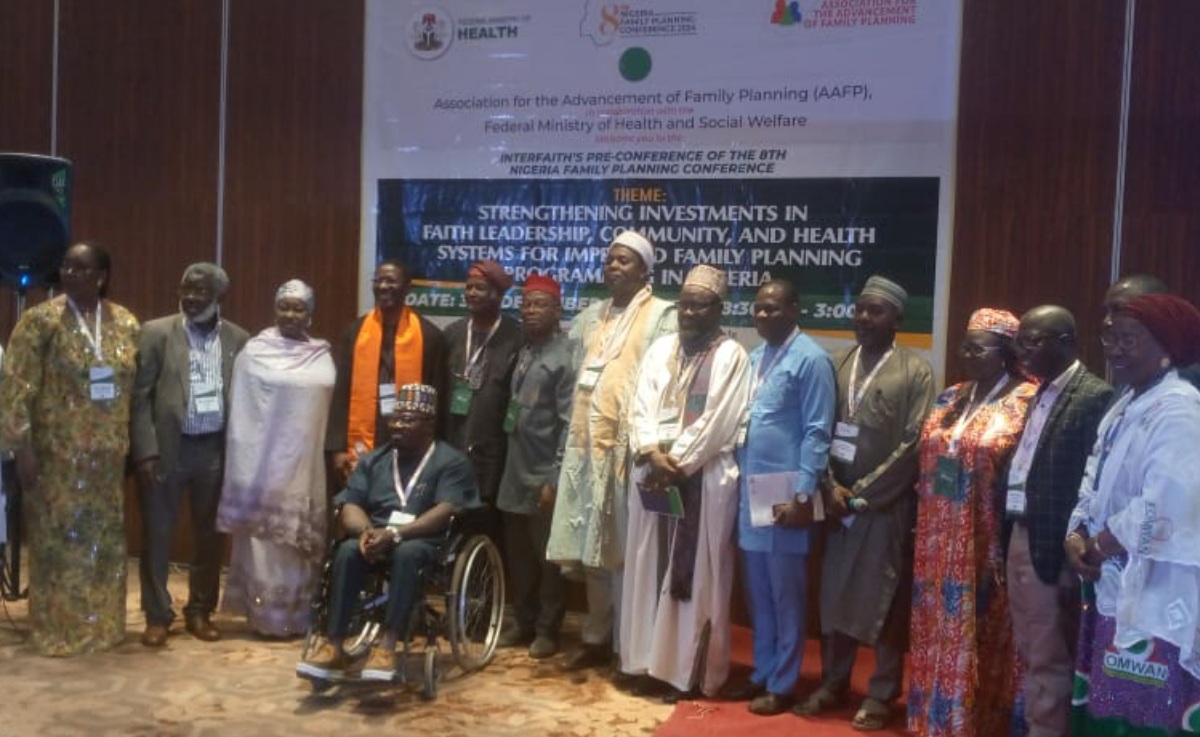By Aderogba George
Dr Ejike Oji, Chairman, Local Organising Committee for the 8th Nigeria Family Planning Conference has underscored the influential role leaders from the faith based organisation play over political figures.
Oji said this during the Inter-faith forum Pre-Conference to herald the 8th Nigeria Family Planning Conference in Abuja on Tuesday.
The News Agency of Nigeria (NAN) reports that the conference is scheduled to hold between Wednesday Dec. 4 and Friday Dec. 6 respectively.
Oji, who is also the Chairman, Association for the Advancement of Family Planning (AAFP), said that faith based leaders had helped in shaping public discourse in so many ocassions.
He said that majority of Nigerians had so much trust on leaders from the faith based organisations, as their influence is life changing.
The LOC Chairman said that politician also listened to leaders from the faith based organisations, thus giving them a wider influence over political figures.
“The role of the faith based leaders extends beyond spiritual guidance and can be pivotal in the promotion of responsible family planning practices,” he said.
He said that their advocacy could resonate with communities more deeply than political or governmental efforts, making them essential in addressing Nigeria’s demographic challenges.
In her goodwill message, Mrs Chinyere Ogbonna, Head of Health Promotion Division, Federal Ministry of Health and Social Welfare, said the government’s effort in addressing family planning.
Ogbonna said that in time past, mentioning family planning caused major challenges in some homes, adding that through the protective health care and health promotion, a lot has changed.
“When we mention health care protection, you are talking about the legal frameworks, the laws and the policies the government is putting in place and bringing together all the partners. She said.
Rev. Isaac Gbadero of Interfaith ZIFSAM, Zaria, Kaduna state emphasised the essential role of faith based leaders in promoting male involvement in family planning to overcome societal barriers.
Gbadero said that faith based leaders were uniquely positioned to shape morals, transform human relationships, and address misconceptions about family planning among men.
“Faith based leaders are trusted voices who guide morals and spirituality, their advocacy opens doors previously closed to discussions on family planning,” he said.
Gbadero said that men’s involvement in family planning was vital to removing barriers women faced in accessing services.
He said that misconceptions and excluding men in campaigns had hindered progress.
“By engaging men through faith based leaders, we can break these barriers and foster an inclusive approach to family planning,” he said.
Dr Dele Abegunde, Country Director of Population Council of Nigeria, outlined the determinants of male involvement and reasons for low participation in family planning.
“Cultural norms, fear of side effects, and lack of exposure to accurate information are significant barriers,” he said.
Abegunde said that common misconceptions such as the belief that contraception caused infertility or health problems can be countered through strategic, community-specific messaging.
“Faith based leaders can play a transformative role in shifting these beliefs and promoting healthy practices,” Abegunde said.
Prof. Oladapo Ladipo, Co-founder of the Association for Reproductive and Family Health (ARFH), urged faith based leaders to include family planning messages in all aspects of community life.
“Family planning should be preached at weddings, naming ceremonies, and even burials,” Ladipo said.
He said that involving faith based leaders would enhance the acceptability and widespread adoption of family planning practices across Nigeria.
Jason Bremner the Data and Measurement Senior Director for Family Planning 2030, emphasised the distinct contraceptive preferences between married and unmarried youth, highlighting the importance of access and choice in family planning.
Bremner, who spoke at the Youth Section of the Pre-Conference, said that among married youths, implants remained the most popular contraceptive method, followed closely by injectables.
“For unmarried, sexually active youths, however, the most common methods are traditional4
“This particular method is considered less effective than modern methods like implants and injectables.
“Implants are number one, and injectables are number two among married youth,” Bremner said.
NEWS AGENCY OF NIGERIA

